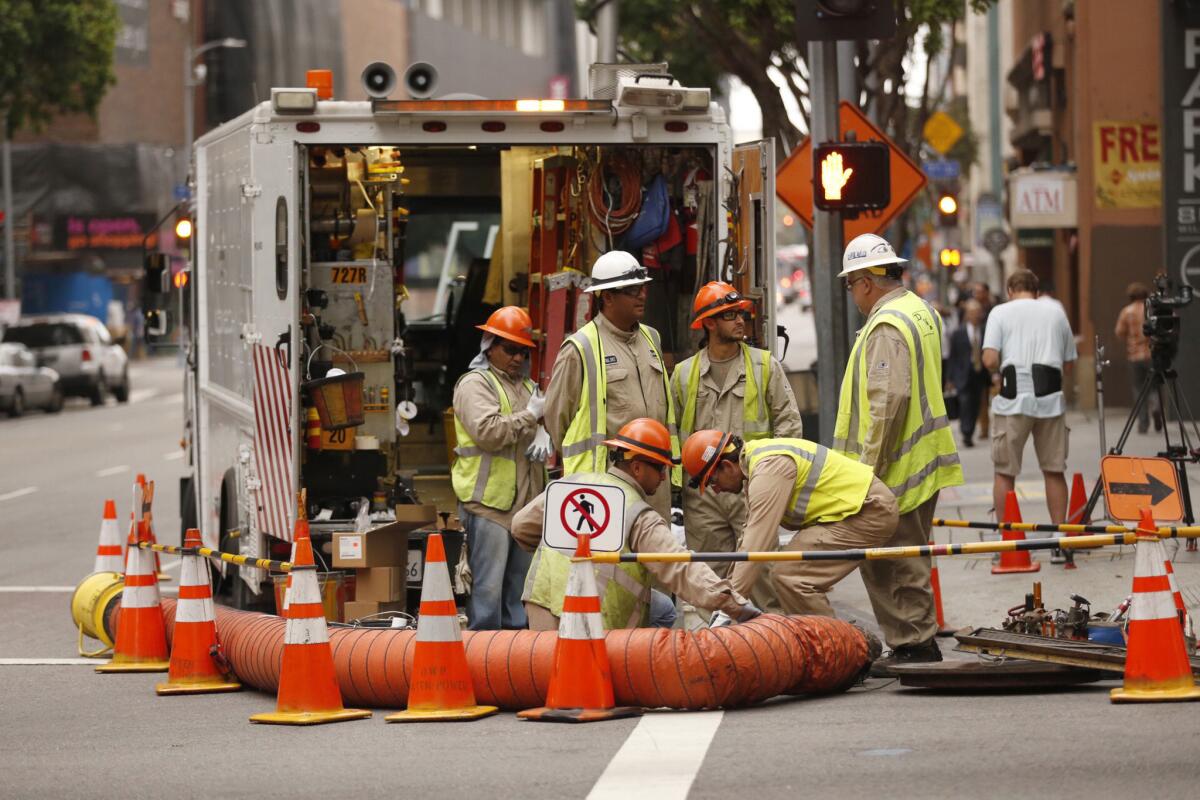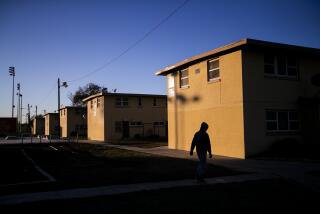L.A. City Council should move to overhaul DWP management, study says

A DWP crew works near a downtown building at the corner of Wilshire and Flower in August.
The Los Angeles City Council should pursue a 2017 ballot measure to change the way the Department of Water and Power is governed — a move that would better ensure the utility is held accountable for its decisions, a consulting firm said in a report issued this week.
The report, released by City Controller Ron Galperin, concluded that there is widespread dissatisfaction with the status quo at the DWP. Power over the agency is too decentralized, the report said, and decisions are overseen by multiple layers of bureaucracy, including “highly political bodies” such as the City Council and the DWP board, whose members are appointed by the mayor.
As a result, “no single entity has enough insight into or authority over department operations and finances to hold it fully accountable,” said the report, prepared by Navigant Consulting Inc.
Navigant did not spell out how the governing structure should be changed, arguing instead that the City Council should establish a committee to conduct an in-depth study of possible solutions. Mel Levine, president of the DWP board, said he supports the idea of forming a committee to look at the issue.
“The bottom line is, there are too many cooks in the kitchen,” he said. “It makes governance extremely difficult. Everybody can get their oar in — and everybody can blame everybody else.”
Galperin also supports creating a committee to come up with a ballot measure.
“On balance, this report shows us a department that delivers water and power dependably to the people of Los Angeles,” he said in a statement. “However, insufficient accountability, lack of transparency and politicization jeopardize the department’s ability to meet the challenges of the future.”
Management of the DWP was a central issue in the 2013 city election, when mayoral candidate Eric Garcetti accused his opponent, then-City Controller Wendy Greuel, of going too easy on the utility with her audits. In campaigning, Garcetti also criticized the DWP’s employee union for spending big on the effort to elect Greuel and promised he would provide an independent voice for ratepayers.
A year later, now-mayor Garcetti used his State of the City address to announce that the DWP would not pursue any rate increases that calendar year. That drew derision from some critics, who said the mayor should focus on making sure the utility has enough money to repair its pipes and other infrastructure.
DWP Commissioner Jill Banks Barad, who was appointed by Garcetti, did not want to comment on the findings of the report because she had not read it yet. But she argued that the five-member board plays an important role, vetting the DWP’s proposals and providing a system of checks and balances.
“I feel that I’m there to represent the ratepayers, and to ask the tough questions,” she said. “I’m not there to just rubber stamp everything that staff is telling us.”
The recommendations on DWP governance come nearly two years after a panel of civic leaders concluded that the DWP is “often subject to political interference.” In April 2014, the LA 2020 Commission called for a separate commission to set rates at the utility rather than the mayor and council.
This week’s report also concluded that the DWP ratepayer advocate, a post created by voters, faces “continuous political pressure” from city and utility officials. That leaves the position “stuck in a ‘no man’s land,’ as it is neither a regulator nor a truly independent adviser.”
Fred Pickel, the city ratepayer advocate, said he was still reading the 581-page report. Like Galperin, Pickel said he welcomed a discussion about alternatives to the existing governance of the utility. But he disagreed with concerns raised about his position, including the idea that the independence of his job is weakened by reporting to DWP board members.
“They exercise no authority over us,” Pickel said.
DWP officials issued a statement welcoming many of the report’s overall findings, noting that it highlights the utility’s work in maintaining “reliable water and power supplies.”
The utility’s statement — issued by general manager Marcie Edwards and Levine — made no mention of the criticism of the agency’s political structure.
Twitter: @DavidZahniser
Twitter: @LATimesEmily
More to Read
Sign up for Essential California
The most important California stories and recommendations in your inbox every morning.
You may occasionally receive promotional content from the Los Angeles Times.












